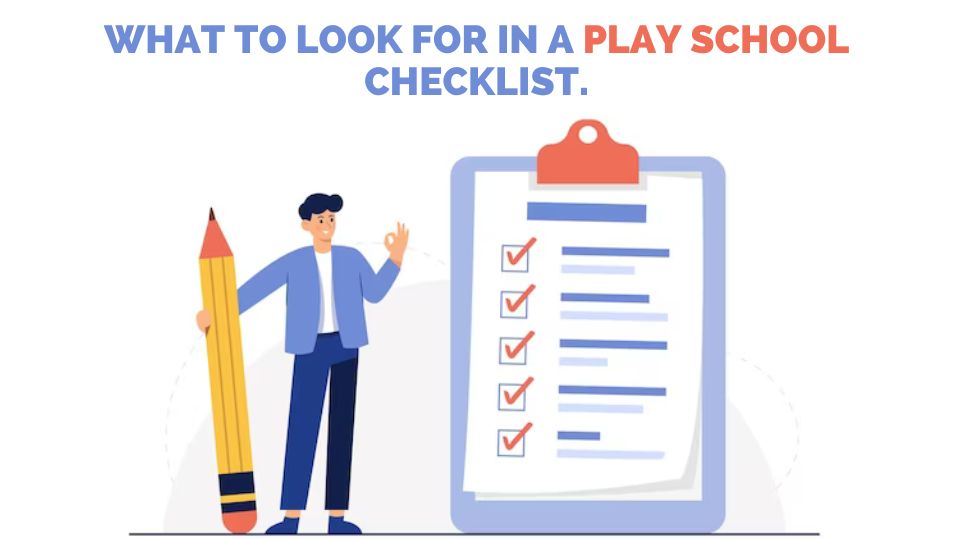What to Look For in a Play School Checklist.
If you're a parent searching for the perfect play school in India, you understand the significance of this decision. The early years of education are the building blocks for your child's future, and selecting the right play school is a crucial step. To help you make the best choice, we've prepared a comprehensive guide that covers essential factors when choosing a play school. This guide will also help you to understand the concept of a "parent app" to enhance your child's learning experience.

Safety First: Ensure the school is in a secure and child-friendly neighborhood.
Health and Hygiene:
Check for a clean and hygienic environment, including safe drinking water and clean restrooms.
Learn about the qualifications and experience of the teaching staff. Experienced and well-qualified educators are essential.
Meal Plans: Check the variety and quality of meals offered to the children.
Special Needs Support:
If you have a child with special needs, ensure the school provides the necessary facilities and support.
Read: How to Choose a Preschool Communication App.
Originally Published by HelloParent.
1. The Right Location and Accessibility
Proximity Matters:
The location of the play schools is the first consideration. It should be conveniently located near your home or workplace for easier daily routines. And for finding nearby preschools in India you can search “play school near me” or the “nearest preschool to me”.Safety First: Ensure the school is in a secure and child-friendly neighborhood.
2. Academic Excellence and Reputation
Track Record:
Investigate the school's reputation and track record in providing quality education. Look for reviews and recommendations.Accreditation and Quality:
Check if the school is accredited by recognized educational bodies, ensuring quality standards are met.Curriculum Compatibility:
Review the curriculum to ensure it aligns with your educational goals and focuses on holistic development.3. Safety and Security Measures
Child Safety:
Inquire about the safety measures in place, such as secure entrances and exits, well-trained staff, and emergency protocols.Health and Hygiene:
Check for a clean and hygienic environment, including safe drinking water and clean restrooms.
4. Infrastructure and Facilities
Adequate Infrastructure:
Assess the school's infrastructure, including classroom space, outdoor play areas, and child-friendly equipment.Digital Integration:
In the modern age, look for schools that incorporate technology into their teaching methods.Educational Resources:
A well-stocked library and access to educational materials are fundamental for a comprehensive education.5. Qualified Educators and Teaching Staff
Teacher Credentials:Learn about the qualifications and experience of the teaching staff. Experienced and well-qualified educators are essential.
6. Effective Communication Channels
Parent-Teacher Connection:
Effective communication between parents and teachers is crucial. Look for a school that encourages regular updates and meetings.Parental Involvement:
Choose a play school that values parental involvement in school activities and decision-making.7. Learning Approach
Play-Based Learning:
Play is a significant component of early childhood education. Ensure that the school incorporates play-based learning to stimulate creativity and curiosity.Nutrition and Meals
Healthy Meals: If the school provides meals, ensure they are nutritious and follow hygiene and safety standards.Meal Plans: Check the variety and quality of meals offered to the children.
8. Extracurricular Activities
Extracurricular Programs:
Inquire about the availability of extracurricular activities, such as music, art, sports, and other enrichment programs.Affordability:
Budget Considerations: Understand the school's fee structure and ensure it aligns with your budget.9. Educational Philosophy and Values
Value Alignment: Choose a school with values that align with your own principles and beliefs.Diversity and Inclusion
Embracing Diversity: Opt for a play school that celebrates diversity and promotes inclusion.Special Needs Support:
If you have a child with special needs, ensure the school provides the necessary facilities and support.
10. Community Involvement
Community Engagement:
Encourage village heads in the respective areas housing these Playway Schools to actively participate in maintenance and infrastructure development.11. Reviews and Recommendations
Parental Insights:
Seek reviews and recommendations from other parents with first-hand experience. Their insights provide valuable information about the school's performance.12. Trial Period
Trial Experience:
Take advantage of any trial period that the school offers. This will give you an opportunity to assess if the school is the right fit for your child.Read: How to Choose a Preschool Communication App.
13. Planning for the Future
Expansion Plans:
Consider the school's plans for future expansion and growth. This can be an indicator of the school's stability and vision.Conclusion:
The selection of a play school is a significant decision. It establishes the foundation for your child's lifelong learning journey. This checklist empowers you to make an informed choice, ensuring your child's early education is nurturing, engaging, and developmentally enriching.Originally Published by HelloParent.

Comments
Post a Comment